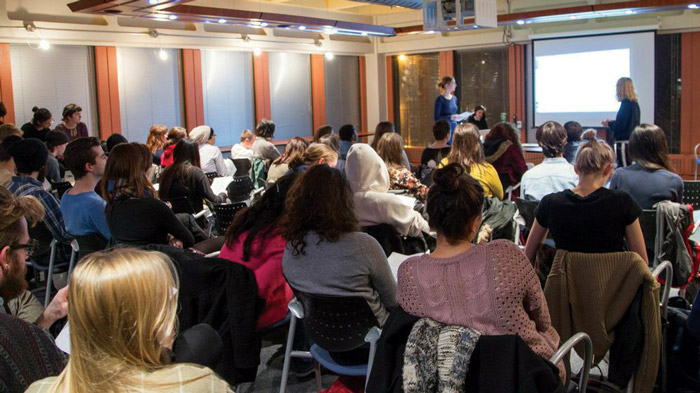The Sexual Assault Policy Working Group held an open forum on the creation of McGill’s first university-wide sexual assault policy on Thursday, Nov. 13. The student working group consists of members from the Students’ Society of McGill University (SSMU), the Union for Gender Empowerment (UGE), the Sexual Assault Centre of the McGill Students’ Society (SACOMSS), and the Quebec Public Interest Research Group at McGill (QPIRG).
A sexual assault policy proposal was drafted by the student working group after the November 2013 Media Relations Office (MRO) mass email regarding sexual assault within the McGill community. Endorsed by signing parties that include the SSMU Council, SSMU Equity, SSMU Executive, SACOMSS, UGE, QPIRG McGill, the Feminist Collective of McGill Law (FCML), and Women and the Criminal Law (WCL), the proposal was presented to the dean of students in March 2014.
Kai O’Doherty, a UGE member, presented at the open forum. He highlighted the history of the policy and explained the importance of the Deputy Provost’s November 2014 MRO, which concerned the then-ongoing case against three MGill athletes and brought the case to the attention of students.
“When [the] case [regarding three McGill football players sexually assaulting a Concordia student] came to light, it really demonstrated McGill’s inadequate response to sexual assault cases on campus,” O’Doherty said. “[This raised] bigger questions on how McGill deals with sexual assault, [including] trying to discuss these issues and consent, and giving resources for survivors.”
According to SSMU VP University Affairs Claire Stewart-Kanigan, and Megan Baiocco, U3 Arts student and member of the UGE, the policy will be structured around four main pillars that are survivor oriented—a proactive approach, an approach that recognizes diversity of experiences related to sexual assault, and a university-wide commitment.
“When we were first creating this policy, we wanted to make sure that it embodied a core set of ideas that we would not give up when negotiating […] or consulting with people,” Baiocco said. “We want to make sure that we keep these four ideas in our policy because they are […] important in the ways that we think about sexual assault and the ways that we feel the university should deal with sexual assault.”
Stewart-Kanigan explained how the proactive pillar impacts the structure of the policy.
“As we saw from the incident with the football players last year […] a reactionary approach to sexual assault […] is not adequate,” Stewart-Kanigan said. “What we want is long-term commitment […] consistent campaigns, [and] consistent resources dedicated to combating the tolerance of sexual assault on our campus. So a big part of this policy is making sure that it is strongly proactive as opposed to reactive.”
Thursday’s meeting was the first time that a draft of the policy was shared with the wider McGill community. Now available online to the general public at sexualassaultpolicyatmcgill.com, the advocates of the policy hope to receive student feedback in order to improve on the policy draft.
Daniel Snyder, L3 law senator, attended the event and explained that he thought that students were ready for a Sexual Assault Policy to be implemented on campus.
“I would like to see continued discussion [and] hopefully people can contribute to voicing their opinion,” Snyder said. “I’ve had numerous conversations with fellow law students and all with positive reaction that people are really interested in this […] I believe that people are already involved, and now that the policy is out, they’ll be able to read it over and give their reactions.”
Presenters at the event stated that an online forum to collect student responses will soon be available on the sexual assault policy website and that anyone interested in becoming a volunteer or learning more can email [email protected].
In reference to disciplinary measures and procedures that have yet to be drafted, Baiocco and Stewart-Kanigan stated that the policy would aim to shape new measures in a way that prioritizes the survivor.
“[Disciplinary action is] a conversation that is going to be happening later down the road, probably a bit closer with the university because [it involves] very specific codes and different [decision makers],” Stewart-Kanigan said.







